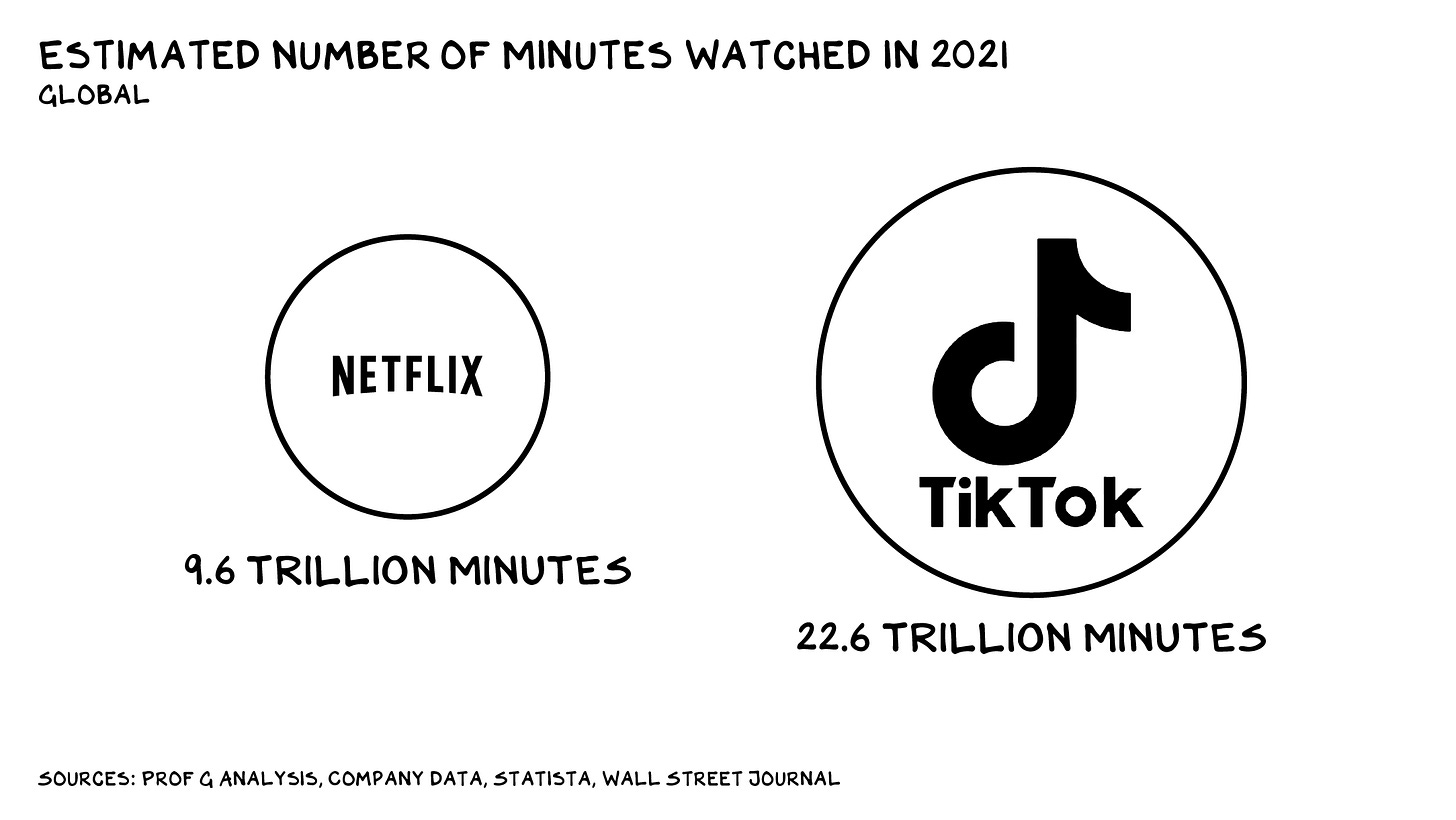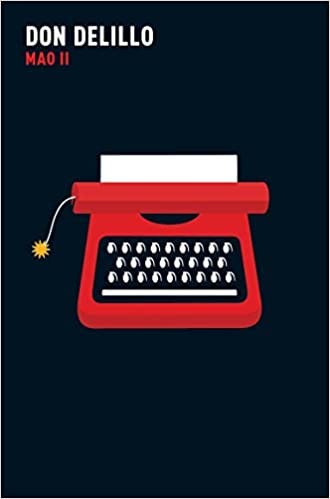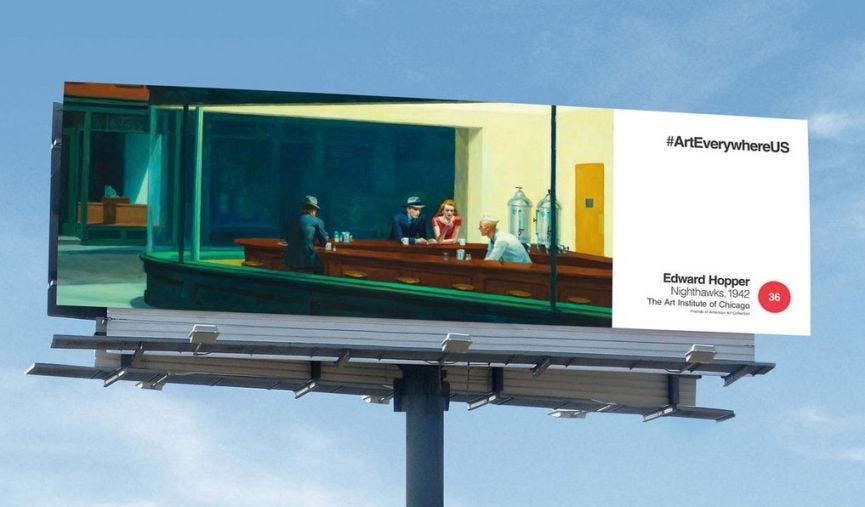A few weeks ago, tech giant Amazon launched a campaign encouraging a behaviour far older than the company itself: reading books. “That Reading Feeling” dramatises the unique emotional transport that books offer.
Judging from the genres & books featured, the casting, the emoji and the focus on the feels at a cultural moment when the word ‘vibe’ is so over-used, it’s aimed at younger audiences. This is Amazon acting like the category leader and growing the overall behaviour of reading. It’s all seamlessly linked to the Amazon Bookstore:
It’s great work combined with solid consumer experience, and I hope its gets lots of people reading more.
Many authors & publishers might argue that if ‘That Publishing with Amazon Feeling’ got its own campaign, it would involve Jeff Bezos squeezing writers’ genitals in a vice as a metaphor for Amazon’s effect on their profitability1. It’s hard not to wish that a broader coalition of publishers was doing this in a way that funnelled money to writers, rather than The Bezos Galactic Dick Voyager Model III.
Even so, it was great to see someone bring the combined strategic smarts & creative talent of a proper agency to encouraging people to read, for one big reason.
This is one of the world’s biggest companies wading into a problem that has stalked culture for a while: fewer and fewer people reading books.
Books are fighting a heroic rearguard action against the onrushing forces of the attention economy2. The average American read 20 minutes a day in 20203, which was the most since the early 2000s but sounds pathetic compared to time spent elsewhere. Publishing had a good few years in terms of books sold4 in both the US & UK, but after the expanded free time of the Lockdown era, an attention crunch5 is happening. This is visible in Netflix's struggles against TikTok eating everyone’s time6.
In the modern attention economy everything competes with everything else.
People only have so much time, and when that time shrinks, someone has to lose. The first casualty of the battle for attention is likely to be reading. When an algorithm pumps out exactly the comedy you like, there’s more shows/movies to watch than ever, and games have matured into interactive art - why would anyone bother with a retro technology like the book?
It’s easy to surrender to the spirit of technological inevitability that dominates our era, and conclude that reading is hopelessly doomed as a behaviour. I am here to offer a different take, and not merely because of The Lindy Effect, or even the fact that the web is made up of text7. We all need to pick up John Waters’ challenge:
“We need to make books cool again. If you go home with somebody and they don't have books, don't fuck them.”
So to restate the case for books, I'm going to skip the traditional literary whinges about the relative cultural value of books vs memes, games or TV series. Instead, let's consider books not just as an art-form, but as media - looking at what reading does to your mind, and why that matters more than ever in 2022.
Books are an attention workout
The media world around reading has got infinitely more complex since the days where its only competition was a good public hanging - but that shift has made reading matter more, because all the media invented after it are easier to consume.
Film is lean-back, low-attention processing media. We know what it does to people’s attention because the media formats around such spaces are easily broken down and sold as ad space to people who want your attention - advertisers and brands hoping to harness that attention to sell you things.
Books are high-attention-processing, lean-forward media. A book demands its readers actively engage to the detriment of everything else. This is what Art Historian Ernst Gombrich called “The Beholder’s Share” - the unique contribution that a viewer or reader brings to a work of art. Games, series and films do a fair bit more of the work for you. A book requires you to co-imagine the story with the author as you’re reading it.
We’re less familiar with this cognitive impact for a simple reason: books are one of the few remaining non-commoditised attention spaces, and there’s less incentive to measure what can’t be sold as advertising space. On a personal level, a clear indicator of the uselessness of books as commercial space is the fact that not once in my 15 years of working in advertising has anyone proposed a book as a media channel.
The act of picking up a book expands & sharpens attention in a culture designed to degrade and redirect it. The more media is dominated by bite-size content & immersive realities, the more we need lean-in, deep attention media. A book is cross-fit for your capacity for attention.
Books are a mind-altering substance
Close your eyes and think of your favourite writer. How distinctively Marlon James, Elena Ferrante, Toni Morrison, Tolstoy, Salman Rushdie & Moisin Hamid observe the world: each of them would see the same person, event or city block differently. Writers are, as Saul Bellow said, ‘first-class noticers’, and their work is a pair of verbal lenses that you put on to give you someone else’s perspective. If they’re great, you lose the ability to take them off.
When you enter a bookshop (physical or digital) you are stepping into a drugstore full of thousands of such mind-altering substances: each one is a verbal sample of someone’s consciousness and perspective which might change your way of seeing the world.
In Mao II - a book dialled into the role of the writer in a networked media world - Don Delillo argues that the role of novelists is to influence the inner life of a culture, and this is still true. Books are the most powerful empathy technology available to us as humans, and there is a burgeoning body of research, as yet not robust, that is starting to explore this.
If you want proof of this, you have only to look at how hard repressive factions in various political arenas try to control what books end up in libraries.
So that’s the message, but what about the media that delivers it?
Books Can’t Just Be Books Any More
This is the real problem. A book is a story, but as Celo co-founder Sep Kamvar said, “A technology is a story with wings.” Books have been a story with underdeveloped technological wings for some time - not quite a Dodo, but a near-flightless bird close to the bottom of the food chain.
It’s been fun making high-speed reads like this and this because they’re an easy way for people to read my writing. Publishers get excited about Audiobooks & BookTok as ways for audiences to read in spaces with less technological friction, but they’ve neglected the hard problem at the heart of their industry: building & scaling a platform for digital distribution of reading.
As Erik Hoel argues, they’ve long contented themselves with battling for their relative portion of a shrinking book market, rather than trying to expand the number of people that will pay to read, and this has allowed other technologies to steal a march on them. Amazon have done it with Kindle, but they’ve funnelled that money away from writers.
There’s lots of noise & excitement about Web3, and what it might do for writers. I am deeply interested by what Web3 might do - more action on this coming soon - but whilst these platforms might excite people hoping to get around useless obstructive gatekeepers to connect with readers directly, it’s way too soon to tell if Web3 is the answer to the problem, and there’s a fair amount of technological friction in reading anything on the blockchain that means it’s unlikely to steal eyeballs from other media right now.
If there is cause for hope, it’s right here on Substack. This is one of the few technological platforms to be actively creating new paying readers: my hunch is that it’s mostly done so by stealing eyeballs from news media towards high-quality non-fictional writers - although I’ve noted the fictional ecosystem starting to bubble up here. Hamish’s recent change of title to Chief Writing Officer is indicative of how deep their commitment is to writers, and I’m sure there’s more to come here. Fingers crossed.
So, in short: we need a renewed push to encourage reading both in terms of communicating its benefits, and making the experience fit to compete with more technologically sophisticated platforms. We need to think about books as media: they’re an attention workout, and a unique mind-altering substance, but they can’t just be books any more.
Reading might be venerable and vulnerable, but it’s also immeasurably valuable, and not just for the emotional transport books offer. The book’s crown as mind-to-mind communication tool might weaken as neuralink or VR become real, but its claim to be a method of sharpening deep attention through the worldview of other humans will not, so long as someone makes that argument forcefully. Amazon have done this well: I just wish it was someone else doing it.
A few final questions for a publisher-and-author-centric marketing strategy for getting people to read:
Can we start the marketing conversation on each book not just with ‘will this book sell?’ but ‘will this make someone who doesn’t think of themselves as a reader read, or pay for writing?’ If no-one does this, then the market shrinks.
How can we get people to experience low-friction versions of this reading experience in other media (audio, poster, video, speed-reading etc)?
What cultural products & media categories do people ‘cross-purchase’ that might offer hints about their reading habits (Amazon are best placed to do this given that they know what you buy and what you watch on Prime).
What are the ‘gateway drug’ fictional genres that kick-start a lifetime of reading (if that’s erotic heroic fantasy or BTS fan-fiction, put snobbery aside and start there).
Can someone more expert than me, for the love of god, please do proper robust research into the effects of reading on our ability to empathise, to understand complex ideas and differing perspectives? We have data on how people watch TV and use social media because those spaces are commercialised.
Can we build bookshop.org its own hardware so that it becomes a vertically-integrated alternative to Amazon?
Who are the audiences that aren’t reading books, and how do we recruit them? For starters: only one in five novels in the UK are bought by a man.
A final thought: in 2013 the UK & US ran nationwide Art Everywhere Initiatives in partnership with various out-of-home providers, purely to promote appreciation of art. For a while, advertising space became art space, and the UK was all the better for it.
It’s high time that a publishing collective did something similar with reading, if only because otherwise Amazon will do it first & steal their future readers.
If you work in publishing or marketing, or some intersection of both, let’s talk.
https://www.thebookseller.com/comment/low-price-at-what-cost
Source: Rex Woodbury, Digital Native
Source: US Bureau of Labor & Statistics, American Time Use Survey, June 2022
Sources: UK - £1.82 billion of physical book sales in the UK last year, +13% on 2020 - Nigel Newton, Publisher’s Association AGM, 2022, US - New York Times, “How The Pandemic Changed the Way We Read”, Mar 2021
https://www.economist.com/international/2021/07/01/as-lockdowns-lift-media-firms-brace-for-an-attention-recession
Source: Scott Galloway, No Mercy No Malice, “Tiktok Boom”, May 2022
https://www.thenewatlantis.com/publications/reading-ourselves-to-death














To the final thought that you've put, I believe Substack too can be a very potent flag bearer for promoting reading. They have sufficient data by now about their readers locations. Them running digital/physical world campaigns (Like the Art everywhere initiatives) can do wonders. Maybe the writers can pitch in an extra something to promote themselves, win-win!
Great piece, and I'm in full agreement. Re: 7th bullet point - the Art of Manliness blog has been on a campaign to get more men reading for quite some time now. A search on the site for "reading books" gives a plethora of essays on why books are important, why men should read them more, and some tips for putting that philosophy into practice. https://www.artofmanliness.com/page/2/?s=reading+books